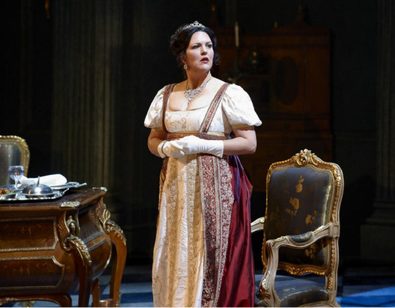 Pieczonka strikes a reflective pose in Tosca.
Pieczonka strikes a reflective pose in Tosca. So I arrived at the Four Seasons Centre on Saturday evening (May 6) with high hopes. And the focus of my heightened expectations was the opportunity to once again hear Toronto’s own Adrianne Pieczonka in the title role. (She previously appeared with the Canadian Opera Company as Tosca in 2012.) Although she’s best known for her German-language roles, she often appears in Tosca: in recent year’s she has portrayed the ill-fated Italian singer in Berlin and Vienna, and next year she’ll sing the role at Covent Garden.
However, there was also a surprise in the cast. Tenor Marcelo Puente was unknown in Toronto before this production – but his name won’t soon be forgotten by local opera fans. He has a substantial voice, rich and warm, yet also with a bright edge when it’s needed. Also, there was a lively, very Italian flexibility to his delivery that made every note he sang urgent and exciting. (No wonder he received such a strong ovation from the audience during the curtain-calls.) Puente brought the same kind of fluidity to his stage presence, portraying Cavaradossi with his whole being.
Our Scarpia for the evening was Markus Marquardt. Like all good Scarpias, he was a dark, sinister, forceful presence. In past productions, I have seen Scarpia made into a complex character: a conflicted religious zealot, or oozing a kind of ironic evil. But Marquardt played it straight, in a stand-and-deliver bad-guy kind of way.
Scenery and costumes by Kevin Knight were pretty much by the book, with little that might offend an “operatic fundamentalist,” concerned about the composer’s intentions, and that sort of thing.
Similarly, stage director Paul Curran has taken a discreet and traditional approach to his job in this Tosca – or so it seemed, as the production unfolded on stage – avoiding willful directorial interventions and trusting his principals to perform the opera as they know how to perform it. And he’s right: these people do know how to do Tosca. But it would have been a fine thing if his efforts could have somehow generated more tension between Pieczonka and Marquardt: they are supposed to have strongly felt (if not exactly pleasant) emotions in their scenes together. Happily, Puente was able to boost the level of interaction, whenever he was on stage.
Last but certainly not least, another energizing force was conductor Keri-Lynn Wilson. Under her baton, the COC Orchestra sounded fresh and vivid, infused with a sustaining energy that ran straight through all three acts.
© Colin Eatock 2017
 RSS Feed
RSS Feed

